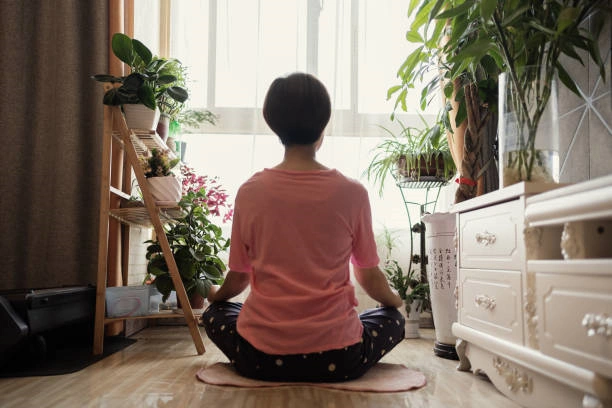Meditation: A Healthy Lifestyle Habit
Meditation has a wide range of positive effects on physical health. Scientific studies have shown that regular meditation can benefit various aspects of the body, including psychological, physiological, and immune system functions.
The Impact of Meditation on Health
- Stress Management: Meditation is widely regarded as an effective tool for managing stress. Through deep relaxation and awareness training, meditation helps reduce physical and mental tension, thereby lowering levels of stress hormones like cortisol and adrenaline.
- Anxiety and Depression: Meditation has been proven to help alleviate symptoms of anxiety and depression. It helps regulate brain activity, improving emotional regulation and stability.
- Attention and Focus: Meditation enhances attention and concentration. By training the ability to focus, meditation can improve working memory, cognitive flexibility, and learning efficiency.
- Sleep Quality: Meditation is believed to improve sleep quality. By helping relax the body and soothe the mind, it reduces insomnia and aids in falling asleep faster.
- Blood Pressure and Cardiovascular Health: Some studies have found that meditation can lower blood pressure and have positive effects on cardiovascular health. By reducing tension and relaxing blood vessels, it helps maintain healthy blood pressure levels.
- Immune System Boost: Meditation is thought to enhance the functioning of the immune system. By reducing chronic inflammation and enhancing the body’s immune response, meditation contributes to overall health.
- Pain Management: Some research suggests that meditation can improve the perception and management of chronic pain. By altering one’s cognitive response to pain and reducing tension caused by pain, meditation plays a positive role in pain management.
- Mind-Body Balance: Meditation helps improve the balance between the body and mind. Through the cultivation of mindfulness and awareness, meditation enables individuals to better cope with life’s challenges and promote overall well-being.
Overall, meditation is a comprehensive tool for mental and physical health that can positively affect the body in many ways. Importantly, meditation is an individualized practice, and each person may experience its benefits in different areas.

Meditation Guide: Steps, Diet, and Mindset Adjustments
Meditation is a practice that uses deep concentration, breathing, and awareness to cultivate inner calm, mindfulness, and mind-body balance. Below are the steps for meditation and key points regarding diet and mindset adjustments during the process.
1. Meditation Steps:
- Find a Quiet Space: Before starting, choose a quiet, distraction-free environment where you can focus on your internal experience.
- Posture: Choose a comfortable posture—either sitting in a chair or cross-legged on the floor. Keep your body upright, allowing energy to flow naturally.
- Focus on Breathing: Direct your attention to your breath. Breathe deeply and slowly, paying attention to how the breath feels in your body.
- Guiding Your Attention: Guide your attention to the present moment, avoiding letting your thoughts wander. You can focus on your breath, bodily sensations, or specific meditation prompts.
- Acceptance and Relaxation: Avoid judging any thoughts or feelings; accept their presence and let them pass through. Relax your body and gradually feel any tension ease away.
- Duration: Start with short sessions and gradually extend the time. Consistency is key—meditate daily, even if just for a few minutes.

2. Diet Adjustments:
- Light Diet: Opt for light, easily digestible foods like fruits, vegetables, whole grains, and broths. Avoid greasy or heavy foods that could cause discomfort during meditation.
- Limit Caffeine and Sugar: Avoid excessive caffeine and sugar intake before meditation, as they can interfere with your sense of calm.
- Hydration: Keep your body hydrated, but avoid drinking too much water before meditation to prevent frequent interruptions.
- Avoid Overeating: Refrain from overeating before meditation to avoid discomfort.
3. Mindset Adjustments:
- Open Mindset: Approach meditation with an open and accepting attitude. Do not set high expectations for your thoughts or feelings.
- Non-Attachment: Do not get attached to immediate results. Understand that meditation is an ongoing practice, and the effects may not be felt right away.
- Kindness to Yourself: If you experience anxiety or discomfort during meditation, be kind to yourself. Let go of the pursuit of a “perfect” meditation state and accept yourself as you are.
- Gratitude and Mindfulness: At the end of meditation, cultivate a sense of gratitude and focus on the present moment. Bring mindfulness into your daily life to extend the peace you gain from meditation into every moment.
Meditation is a profound practice that requires patience and continuous effort. By following the right steps, adjusting your diet, and refining your mindset, you can better immerse yourself in the practice and enjoy the benefits of mental and physical health and peace. Each person’s meditation experience is unique, so it’s encouraged to adjust your practice over time to find what works best for you. With time, meditation may become a delightful and revitalizing part of your life.








